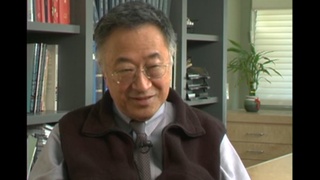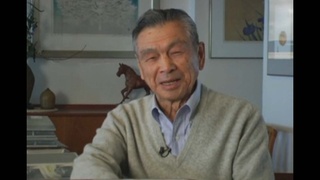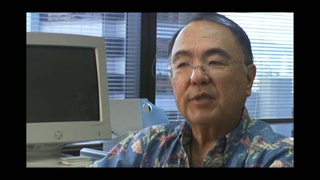Interviews
Traumatic experiences before camp
I know my father was coming home from Long Beach, he was..from the hog ranch, you know and he didn’t come home. And he was put in jail, my father came out – but he was released the next day – and his experience there must have been quite traumatic because he could hardly talk about it. He said he saw these drunks in there being hit over the head and, you know, mistreated. And, I mean, he told about it just once – he never talked about it after that. I mean, it was quite traumatic to him I think, that experience.
But worst of all though, at least my father got, was released the first day afterwards, but so many of them, like if they were head of an organization or if they held any position of merit, you know, they put them in the…well they took them away without the family knowing where they were gonna go.
So, the rumors at that time was, be sure – to the men – you have a coat or something to wear, cause they’ll take you, just spirit you away. And I think that was such a traumatic experience for me to see, when I was there. So I couldn’t even talk about it for a long time, but you never hear about it from anybody else, you know. Yeah, you only hear about the camp experience, but to me, I think the experience before was even worse.
Date: March 31, 2005
Location: California, US
Interviewer: Gwenn M. Jensen
Contributed by: Watase Media Arts Center, Japanese American National Museum
Explore More Videos

Institutionalization as a bad aspect of camp
(1924-2018) Researcher, Activist

Different tension between East Coast and Los Angeles
Japanese American Creative designer living in Japan

His experiences in Chicago after WWII
(b.1929) Pioneer medical researcher in tissue transfer and organ transplantation.


Less information about Hawai‘i in mainland
(b.1944) Founder of Kobayashi Group, LLC


A teenager's memories of how a local newspaper misrepresented Japanese Americans
(b. 1925) Draft resister

Reaction of Japanese American community toward draft resistance stance
(b. 1925) Draft resister

The role of the media in influencing people's opinions
(b. 1925) Draft resister

Reaction to a 1942 speech by Mike Masaoka, Japanese American Citizen League's National Secretary
(1915 - 2011) Nisei florist who resettled in New York City after WW II. Active in Japanese American civil rights movement

Deciding whether to answer "yes-yes" on the loyalty questionnaire in order to leave camp
(b. 1925) Draft resister

First learning about the incarceration experience in college
(b. 1955) Lawyer


Feeling angry upon reading of Supreme Court case, 'Korematsu v. United States'
(b. 1955) Lawyer

Reasons for conformity and competitiveness in Gardena, California
(b. 1946) Lawyer
